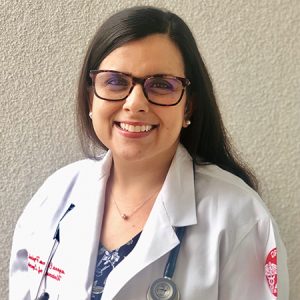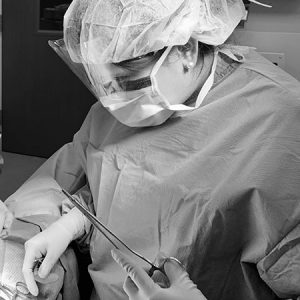How COVID-19 Changed My PA School
A Quick Transition to Online Rotations and Telemedicine
July 13, 2020
By Sunayana Pydah, PA-S

In mid-March, I had just attended AAPA’s Leadership and Advocacy Summit and was on my way from my PA program at University of Lynchburg to California, where I planned to spend spring break and then begin my ninth rotation in family medicine at the Santa Clara Valley Medical Center. When I arrived, I met with the Director of Advance Practice Providers and there were no specific restrictions on student rotations. Only two days later, things changed drastically. My PA program announced a one-week extension to spring break due to the rise in the number of COVID-19 cases in the U. S.; cases had just reached over 1,000. With the extension to spring break, I could not start my rotation when planned and regretfully informed my preceptor of the delay. However, I understood that student safety was my PA program’s top priority.
[On the Front Lines: PA Student Dustin Norman]
Online rotations
The following week, I was informed by my clinical rotation site that all student and volunteer activities had been cancelled until further notice. This left me disheartened as I wanted to help and provide care for individuals to the best of my abilities. I tried to look at the positives, however – my PA program’s faculty was extremely supportive and I was able to be home with my husband during the pandemic.
[Check out AAPA’s Student Member Resources]
During a class meeting, our Director of Clinical Education introduced our cohort to the idea of online rotations. The concept of meeting learning objectives for clinical rotations in an online setting presented interesting challenges. How would we interact with patients and obtain a complete history? But I trusted that the faculty had it planned out. We started with virtual simulation cases and problem-based learning discussions where we were able to obtain histories by interacting with “robot” patients. The technology was incredible – it identified the key concepts we missed in the patient’s history and evaluated whether we, as the providers, were being empathetic with the patient based on the questions we asked. While we missed the aspects of interacting with real-life patients in a clinical setting, these proxies provided a wonderful learning experience.
As we came to the end of this two-week rotation, the number of cases of COVID-19 rose to over 300,000 in the country. Our faculty members worked tirelessly to devise a plan for their clinical students to start the summative phase of our program which is usually conducted after the end of all our 11 rotations. Under normal circumstances, we’d be using the time to prepare for the PANCE and complete our master’s research project. Even with the unknowns, I was confident that our faculty were determined to help us graduate on time.
[How a PA in Telehealth is Helping Respond to COVID-19]
Telemedicine experience
During my first week of summative phase and reviewing for the PANCE, I had the opportunity to interact with patients in various specialty practices using telemedicine and interact with individuals through the New York City COVID-19 hotline. Our faculty worked very hard to establish relationships with our PA preceptors and our University of Lynchburg Doctor of Medical Science students and alumni, who were able to help us get direct patient-care experience, even during the state-mandated “shelter in place” order. Although telemedicine existed prior to the pandemic, its use in the healthcare system has evolved rapidly in the current times. Telemedicine has been an essential tool for our PA class – it is a similar experience to being in the office with a patient. Providers can obtain insight and information on the life of their patient and patients feel comforted to see their providers. With the use of telemedicine, we were able to continue our education and we were able to help patients manage chronic disease states and stay out of emergency rooms and urgent care centers whenever possible.
After completing the six-week summative phase in mid-May, various states were still under “shelter in place” orders. At that time, the University of Lynchburg was actively evaluating whether it would be safe to have students back on campus. For the next month, we completed two additional weeks of rotations online. We developed problem-based learning cases to discuss in small groups, we saw patients via telemedicine, and we performed objective structured clinical examinations (OSCE) online.

On track to graduate
As county and state safety regulations evolved, we finally got the opportunity to step back into the clinic. For the safety of patients and providers, safety protocols had become more rigorous. For example, my temperature was taken prior to entering the clinic and a face mask had to be worn at all times. The biggest change, however, was the palatable fear in patients’ voices while discussing their COVID-19 test results during telephone and video encounters. I have worked on teams that treat patients with cancer and other severe chronic diseases. I am trained to help patients work through their fears at any stage but treating COVID-19 patients was different. Patients are uncertain of the illness. They are scared of spreading the disease to their loved ones. They don’t know what they should or should not do. These last few rotations have had an everlasting impact on me as a future provider.
The University of Lynchburg PA Medicine Class of 2020 is five weeks away from graduating and I am thoroughly excited to celebrate my long white coat ceremony with my PA program family. Although we will not be celebrating the way we envisioned, we will have the opportunity to celebrate virtually with our close family and friends. Going through this pandemic with my peers has been challenging, but humbling. I am very grateful for all the support our faculty has provided us.
Sunayana Pydah is a third-year PA student at the University of Lynchburg in Lynchburg, Virginia.
You May Also Like
The Ups and Downs of My First Year as a PA
On the Front Lines: PA Student Dustin Norman
Alphabet Soup: PA Profession Terms, Explained
Thank you for reading AAPA’s News Central
You have 2 articles left this month. Create a free account to read more stories, or become a member for more access to exclusive benefits! Already have an account? Log in.



